Israel Shutters Aleppo Airport On Eve Of Raisi’s Visit To Syria
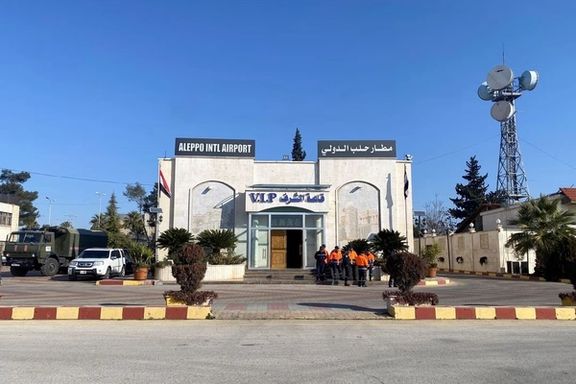
A soldier has been killed and seven others wounded, including 2 civilians, in an Israeli airstrike on Aleppo Airport on the eve of the Iranian president’s visit to Syria.

A soldier has been killed and seven others wounded, including 2 civilians, in an Israeli airstrike on Aleppo Airport on the eve of the Iranian president’s visit to Syria.
According to Syria's state news agency, SANA, Israeli warplanes attacked the airport and other sites near the city on Monday night, leaving the airport out of service.
The symbolic attack, one of a series in recent years in the shadow war between Israel and Iran, comes right before Iranian President Ebrahim Raisi travels to the Arab country at the official invitation of the Syrian president for a two-day visit.
Raisi’s visit is the first by an Iranian president since the start of Syria's civil war in 2011.
SANA claims Syrian air defense intercepted several incoming missiles following the Israeli invasion, a frequent claim by Damascus questioned by military analysts.
Israel has been attacking what it has described as Iran-linked targets in Syria since 2017, to prevent Islamic Republic forces getting entrenched near its northern borders and weapons reaching the Lebanese Hezbollah.
Iran intervened in the Syrian civil war as early as 2011 to defeat a rebellion against strongman Bashar Al-Assad.
Iran says its officers serve in an advisory role in Syria at the invitation of Damascus. Hundreds of Iranian forces and thousands of proxy militiamen including senior officers have been killed in Syria during the war.
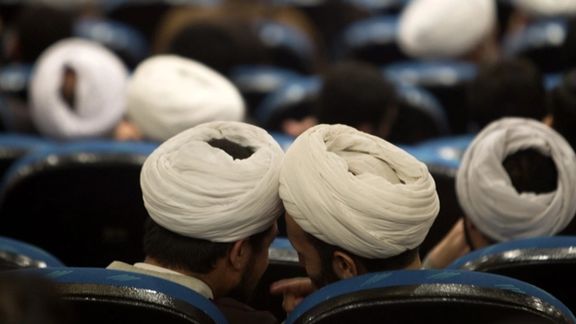
Following three attacks on clerics in Iran in less than one week, Chief Justice Gholamhossein Mohseni Ejei called for swift and strict measures against the attackers.
Conservative Nameh News quoted Ejei as saying, "The enemies are hatching conspiracies to undermine Iran's security," but he did not say who the enemies were.
Several Iranian politicians and journalists had warned earlier that the government's violent treatment of Iranian protesters will entail similar reaction by the people.
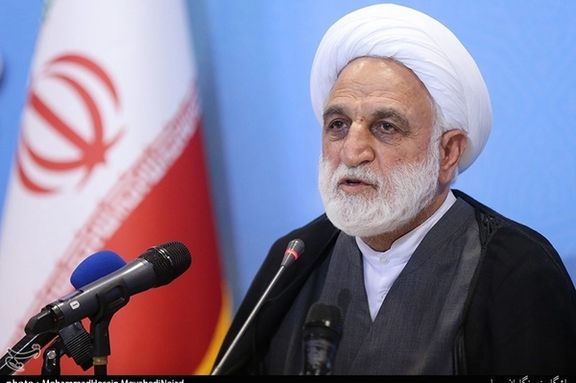
On April 26, a guard at a bank in Babolsar by the Caspian Sea shot Abas Ali Soleimani, a high-ranking cleric who was a member of Iran's Assembly of Expert and a former provincial representative of Supreme Leader Ali Khamenei. The cleric died instantly but the case remains a mystery.
His family say he was at the bank to transfer some money, but social media users say one does not need to go to a bank to transfer money. Another account of the event indicates that the guard, a former policeman killed the cleric when he found out that he was waiting to withdraw a huge amount of money. According to witnesses on the scene the frustrated former policeman was having financial problems and was angry about inequalities in society.
Later, another cleric, a young man was run over by a car and was dragged in the streets for quite a while before the driver steered away and escaped.
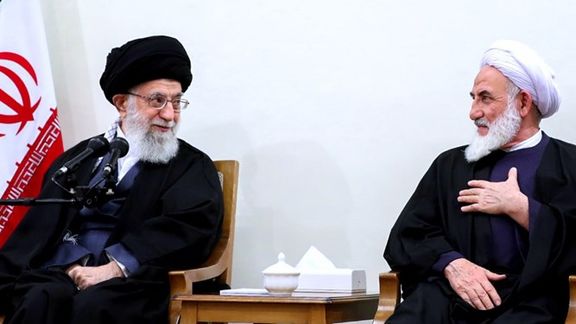
In one of the latest violent events against clerics, early in the morning of April 29, a car ran over two seminary students [clerics] at a bus stop in in Qom. Subsequently, the driver came out and stabbed one of the clerics. The stabber then attacked the police and wanted to disarm them, but he was finally arrested by the "brave policemen."
There is also an unconfirmed anecdotal account of two other clerics who were tied up to a tree and harassed by youngsters in Qaleh Hassan Khan in southwest Tehran.
A cleric in Qom, Alavi Boroujerdi, has criticized the government for creating the divide between the people and the clerics. He reiterated that the government has made mistakes.
He told state officials, "Do not say anything to annoy the people. It is unthinkable to see a cleric being run over in the street in a religious city such as Qom and then stabbing the poor man to make sure that he is badly wounded. Is this the way the people used to treat us?" asked Alavi Boroujerdi.
Chief Justice Ejei told Judiciary officials, "do not waste any time as soon as the attackers have been arrested, make them taste justice!" This was exactly the kind of words Boroujerdi advised officials to avoid if they do not wish to annoy the people.
During previous weeks, while the government was keen to enforce compulsory hijab rules as women defied the imposed lifestyle and took to the streets, many clerics, particularly those in the government used vulgar words about Iranian women and some politicians such as the hard-line editor of Kayhan daily, Hossein Shariatmadari, suggested that unveiled women should be deprived of the social rights and their ID cards should be confiscated.
Among those who criticized Shariatmadari for the comment was a female adviser to President Ebrahim Raisi, Sakineh Sadat Pad who called the suggestion "illegal."
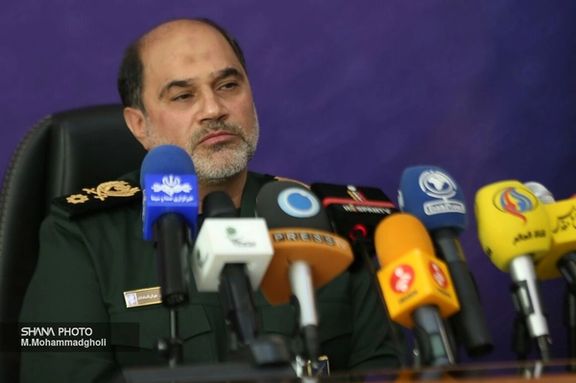
Commander of Iran’s Revolutionary Guard’s Khatam al-Anbiya contracting arm was removed from his post only two years after being in office.
n Monday, Brigadier General Hossein Housh Al-Sadat was replaced by another IRGC commander Abdolreza Abed.
As a top commander in Iran's western Kordestan province during the Iran-Iraq war in the 1980s, Abed led IRGC engineering units. He has also served as the CEO of oil, gas and petrochemical holding in Khatam al-Anbiya.
When the former Commander of Khatam-al Anbiya Construction Headquarters Saeed Mohammad announced his bid for presidency in 2021, Housh al-Sadat replaced him.
At the time some politicians had opposed Housh Al-Sadat's appointment questioning at his financial integrity.
Khatam al-Anbiya Construction Headquarter is one of Iran's largest contractors in industrial and development projects. It was created during the 1980–88 Iran–Iraq War to help rebuild the country and has diversified over the years into companies dealing with mechanical engineering, energy, mining, and defense.
Involvement of the IRGC in business began in earnest two decades ago and has become a highly controversial issue in the country. Former president Hassan Rouhani in 2017 publicly criticized the practice and met a quick reaction by hardliners. He had to retract his statements at the time.
In February, the head of Iranian National Tax Administration (INTA) threatened a reporter who asked him why Khatam-al Anbiya does not pay taxes since 2017.
In response, the INTA chief threatened the reporter, saying he has to provide documents to back up his question, and if the documents are not presented, the prosecutor will indict him.
No reporter in Iran can obtain such documents.
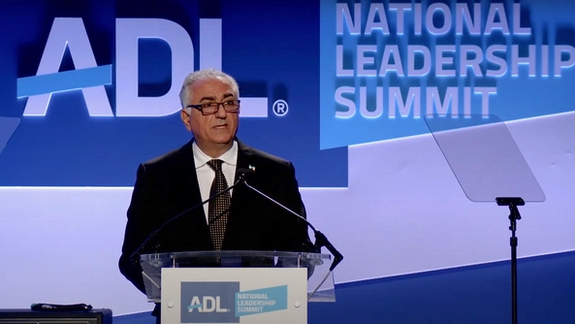
Iran’s exiled Prince Reza Pahlavi delivered a speech to over 500 members from one of the leading US anti-hate NGOs, speaking of a democratic, secular Iran.
At one of the world’s leading organizations specializing in civil rights law, Pahlavi made the powerful address in Washington, slamming the regime's campaign of oppressing women and minorities.
Pahlavi, a viable alternative to the regime in the eyes of the Iranian people, spoke of the current women led movement to topple the regime. “Iranian women quickly became the foremost target of the revolutionaries and their new government. They were publicly beaten, harassed, and segregated from the early days of the revolution,” he said, underlining that for four decades women have been systematically disenfranchised by the regime.
He cited that “most notably [women are] legally considered to be worth half of a man” according to the Islamic Republic’s interpretation of Islamic law or sharia, and spoke of the regime’s campaign of bigotry against its minorities.
While he acknowledged the deep anti-semitism and holocaust denial intrinsic to the regime, the hatred does not stop with the Jewish people, Pahlavi also referring to the Islamic Republic’s campaign of bigotry against religious minorities including members of the Baha’i faith as well as Sunni Muslims, who constitute about 10 percent of Iran’s 88 million population.
“Members of the Baha'i faith are punished for their religious beliefs, face government-mandated discrimination in schools and workplaces, and experience property confiscation and desecration of their cemeteries. Sunni Muslims were denied the right to worship in their own mosques. Christians were forced into secretive house churches.”
He also referred to his recent trip to Israel, in which he met with Prime Minister Benjamin Netanyahu among other leading figures and community members. He said: “I visited Israel to stand up against the Islamic Republic's antisemitism, and to stand in solidarity with victims of the Holocaust in the face of the regime's Holocaust denial.”
“I went to mourn with the victims of the regime-sponsored terrorism, but I also went to Israel to stand up for my people, so that there will be no further victims of hate and bigotry,” he added.
He called the historic trip “a new vision for our region, a vision that is not bogged down in the forced ideological divisions of recent decades but instead based on ancient ways of our lands and connections between our people”.
Peace in the region will only be sustainable when a secular democratic Iran joins its ranks, he said.
At the event, marking the 75th anniversary since the founding of the State of Israel, Israel's President Isaac Herzog delivered a virtual message to the attendees about the threats posed by the Islamic Republic to Israel and other countries of the region.
ADL Director Jonathan Greenblatt -- who served as a special assistant to former president Barack Obama and director of the White House Office of Social Innovation and Civic Participation -- spoke of his sympathy for the Iranian people who are suffering from “brutality and oppression of the Islamic regime”.
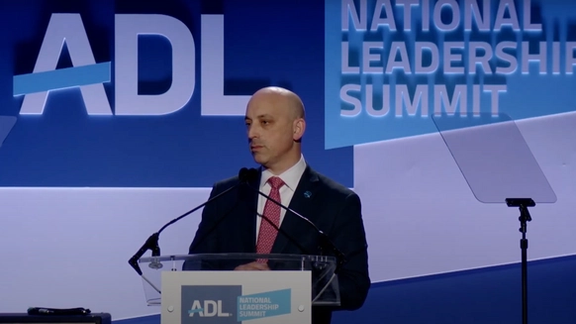
He went on to speak of Iran’s destabilizing influence across the Middle East and beyond through its proxies. "It is an extremist regime with an ideology as dangerous as Al-Qaeda, because it is unwilling to reconcile societies,” he said. “Indeed, Iran is the leading state sponsor of terror around the world and a country whose number one export is antisemitism.”
Greenblatt hailed Pahlavi, seen by many as a legitimate alternative to the regime, a “catalyst for a free, democratic, and secular Iran; one at peace with its own people, at peace with Israel, and at peace with the world”.
Earlier in the day, Pahlavi slammed a letter by 32 Knesset members to Israeli Foreign Minister Eli Cohen, threatening Iran's territorial integrity. Describing the letter as “completely unacceptable and a service to the interests of the anti-Iranian Islamic Republic regime,” he called it “in total conflict with the positions communicated to me by Israeli leaders and senior government officials.”
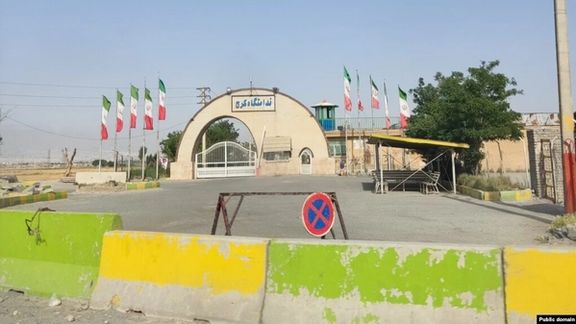
Iran International can reveal that political prisoners in Ward 15 of Karaj Central Prison are in “dire” conditions.
Insiders say political prisoners are being deprived of the minimum rights and have not been able to contact their families for two weeks.
In addition, prisoners do not have beds to sleep in and no place to heat their food. The inmates have access to just one telephone line which is tied up most of the time.
Informed sources say there is no canteen for them to buy snacks or essential items.
“The prison food is of a very low quality and as a result inmates suffered stomachache and many other problems,” the source said.
Sources say there are no training courses and gyms, and the detainees routinely take pills to fall asleep.
Political prisoners have been threatened that if they protest, they will be sent to other wards where prisoners of crimes related to drugs, robbery, or murder are locked up. All phone conversations are also being tapped to exert more pressure.
The reason for these pressure tactics can be of a deterrent nature, to intimidate activists and would be protesters from engaging in anti-regime activities. It could also have coercive purpose to extract confessions or cooperation from prisoners.
Prison authorities refuse to provide medicine and proper treatment to political prisoners and seek to make the conditions more difficult by creating psychological stress.
They also harass the political prisoners of Ward 15 refusing to allow them to have face-to-face visits, and the inmates can visit their families every two to three months.
Some of the prisoners in the ward are those arrested in the case of the killing of Basij agent Ruhollah Ajamian in November.
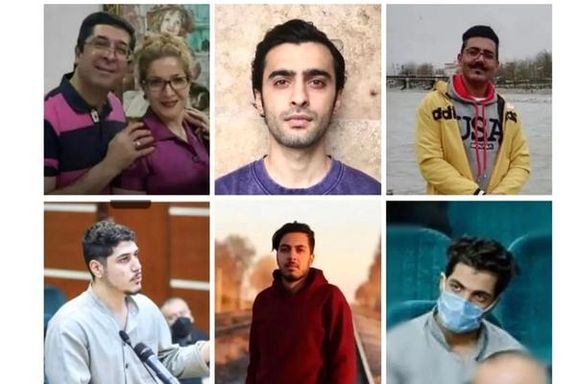
Ruhollah Ajamian was killed in Karaj, near Tehran, a group of men the regime called “rioters”. The member of the Basij militia of the Revolutionary Guards (IRGC) was stabbed, beaten, and stripped naked by a group of men and died of his injuries later.
The Islamic Republic has already executed Mohammad Mehdi Karami and Mohammad Hossein over Ajamian’s death.
14 protesters were also jailed in connection with the killing, with five of them receiving long-term prison terms of 10 and 15 years earlier this month.
Jurists and human rights activists have described the trials as “unfair” and questioned the verdicts.
The judiciary of Alborz province claimed that the charges leading to the verdict were not "intentional murder" but "corruption of the earth" and "moharebeh", or “waging war against God”.
Among the defendants, Hamid Qarahasanlou, who was previously sentenced to death, received the longest prison term and was given 15 years in prison. He and his wife Farzaneh Qarahasanlou are set to serve their sentence in the religious city of Mashhad in the northeast.
These are only some of the lengthy sentences handed down by the Iranian regime to countless protesters in the widespread demonstrations that followed the death in custody of 22-year-old Mahsa Amini last September.
Protests broke out in scores of cities across Iran, with crowds demanding justice for Mahsa and calling for an end to the regime’s oppressive policies.

At least 50 labor activists in Tehran, Kordestan and Gilan provinces have been summoned on the eve of International Workers Day.
Pressure increased on teacher and worker union activists ahead of International Workers Day, but rallies took place in Tehran and other cities mostly by retired workers.
Security agents have warned labor activists they are forbidden from attending May Day gatherings on Monday.
The Free Union of Iranian Workers announced that two members of its board of directors, were threatened and interrogated by intelligence agencies.
According to Hengaw Kurdish-Iranian human rights monitoring group, at least eight other labor activists have been summoned in the Western Kurdish city of Sanandaj.
The summons issued while calls for holding a rally to commemorate May Day have been published by the labor activists.
Meanwhile, the Writers' Association of Iran has called for the unconditional release of all labor activists, including Keyvan Mohtadi and other political prisoners.
The Council of Retirees of Iran also published a statement to slam the economic policies of the regime which have “destroyed the life of workers”.
On the eve of the international day of protests, the Central Council of Iran's National Front released a statement claiming “Iranian workers are increasingly under economic pressures facing the most severe livelihood problems”.
On Sunday, a group of 15 trade unions and civil rights groups issued a statement on the eve of International Workers' Day to voice support for the ongoing protests and strikes in Iran.